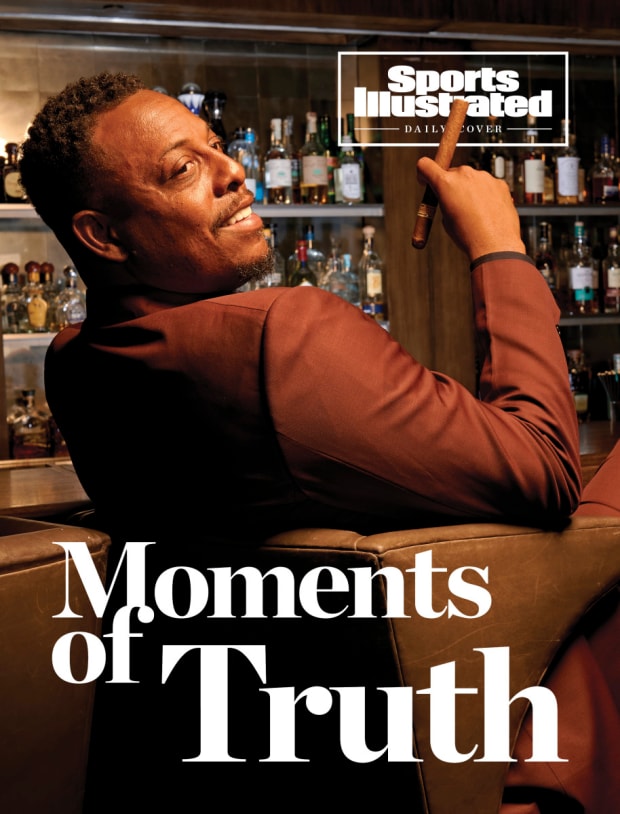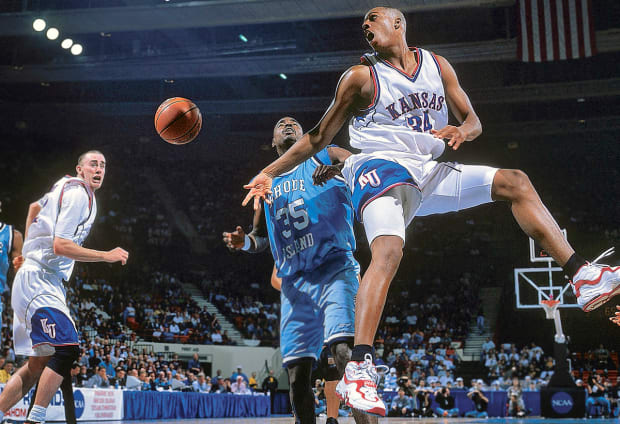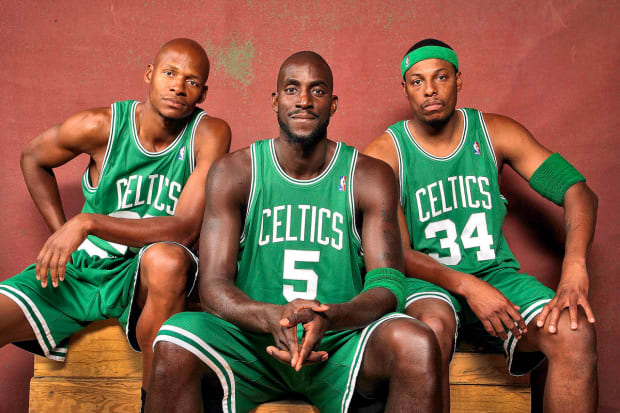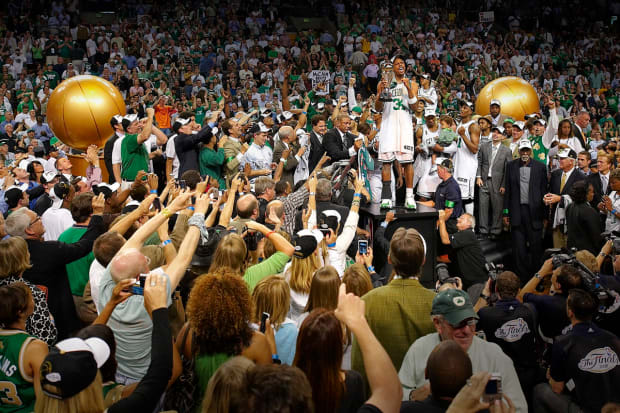As the Celtics legend prepares to be enshrined, he is unapologetic about his past—and bullish about his future.
Let’s start here: Paul Pierce isn’t sorry.
Not for the video, that minutes-long clip that made the rounds on social media, the one that cost
Pierce his job at ESPN. Honestly, Pierce didn’t even know he made a video. Here’s what happened: In April, Pierce was playing poker at a friend’s house in Los Angeles. There was drinking. And smoking. And strippers. And after a little too much drinking and smoking, Pierce decided to start an Instagram Live and, well, show off the strippers. He went on for a few minutes, riffing, he thought, for a couple hundred people. When he finished, he deleted it. He didn’t know IG Lives can be recorded (they can) and reposted (it was). Pierce went home that night thinking no one noticed. He woke up the next day and discovered everyone had.Still . . . sorry? “For what?” asks Pierce. It’s early July, and Pierce is reclining in a straight-backed chair at The Spot, a hookah lounge tucked into a strip mall in Encino, Calif. Around him, clusters of 20- and 30-somethings, many on laptops huddled over glowing screens, oblivious to the presence of basketball royalty. Hours earlier, Pierce was at home, a tailor dispatched by the Basketball Hall of Fame taking measurements for a suit to fit Pierce’s 6’7” frame. “I haven’t bought a new suit since I retired,” says Pierce. But he needed something to wear in September for his enshrinement in Springfield, Mass., 90 miles from where he spent the bulk of his 19-year NBA career.

Kohjiro Kinno/Sports Illustrated
ESPN didn’t ask for an apology. The relationship between Pierce and the network had become strained over the past two years. Pierce hated the travel. Network executives didn’t think he was working hard enough. The video, industry sources told Sports Illustrated, was the last straw. “I was done with them, anyway,” says Pierce between pulls of lemon mint. “It wasn’t a great fit. There’s a lot of stuff over there that you can’t say. And you have to talk about LeBron all the time.”
Pierce’s longtime agent, Jeff Schwartz, suggested Pierce apologize anyway. Schwartz worried that the video might influence Hall voters. Pierce didn’t. “Come on, I didn’t do anything illegal,” says Pierce. “These motherf-----s in the Hall of Fame, some did [cocaine], f---ing battery. What the f--- did I do? I was just having a good time. All the people coming after me, half you motherf-----s do the same s---. You’re just hiding it. And you all are married while you’re doing it. I’m divorced. I’m retired. I’m having fun.” And if Hall voters had held it against him? “Listen,” says Pierce, “if I didn’t make it with this class, it would be the biggest stiff job in Hall of Fame history.”
Schwartz suggested Pierce speak to Jerry Colangelo, the longtime NBA and USA Basketball exec who doubled as Hall chairman. Pierce agreed. In May, Pierce was in Springfield for former teammate Kevin Garnett’s induction. At a dinner, he approached Colangelo. Pierce repeated: He didn’t think he did anything wrong. “What happened has nothing to do with what I did on the court,” says Pierce.
Colangelo shrugged. “I just told him, ‘To clear up the circumstances, you may want to come out and say something,’ ” says Colangelo. “Don’t leave any doubt in anyone’s mind. Who knows how people are going to be affected by what they saw? I told him he ought to think about [apologizing]. That’s all. And he chose not to. And that’s fine.”
Days later, the Hall made it official: Pierce was in. That had never been a dream, says Pierce. “It’s hard to be a kid and say, ‘I want to make the Hall of Fame,’ ” he says. “I think all the players who make it play like they are going to go out and go as hard as they can, and the results at the end of the day, that’s what your career is.” Still, there is no doubt Pierce relishes the honor. Because many NBA teams—nine, if we’re being specific—passed on the chance to pick a Hall of Famer.

David E. Klutho/Sports Illustrated
Panic. That’s what Rick Pitino remembers. It was June 1998, and Pitino, the Celtics’ coach and president of basketball operations, was huddled in Boston’s draft room. A month earlier, Pitino was vacationing in Europe. Boston assistant general manager Chris Wallace called. Wallace had become enthralled with a 6’ 11” German forward he had first seen at the Nike Hoop Summit. The player, Dirk Nowitzki, was available for a workout. Wallace asked whether Pitino could get to Rome to go and see him.
In Rome, Pitino watched the gangly 19-year old bang in threes like a guard. “I was blown away,” recalls Pitino. At lunch, Pitino told Nowitzki: Skip the draft combine. I’ll take you at No. 10. Nowitzki asked Pitino how he could trust him. Pitino got Red Auerbach, the Celtics’ vice chairman, on the phone, and, according to Pitino, Nowitzki was sold. “I went home,” says Pitino, “thinking we had our guy.”
On draft night, Pitino was relaxed. Michael Olowokandi went No. 1 to the Clippers . . . then Mike Bibby . . . then Raef LaFrentz . . . Antawn Jamison . . . Vince Carter. At six, Dallas took Robert Traylor. Wallace exhaled. He knew the Mavs liked Nowitzki. Dallas assistant general manager Donnie Nelson had a reputation for mining top international prospects. Wallace had Nowitzki in his sights . . . until Milwaukee grabbed him at No. 9, immediately flipping him to Dallas in a swap for Traylor. F---, Pitino mumbled to himself. They got him.
From there, says Pitino, “We were scurrying.” It wasn’t that they didn’t know much about Pierce. They didn’t know anything. Why would they? Every projection had Pierce off the board inside the first few picks. “I hadn’t done my homework on Paul at all,” says Pitino. In the room, Wallace was reassuring. “Rick got a little nervous,” says Wallace. “He wanted to know what everybody knew that we didn’t. And I just said, ‘Well, if he’s there, just don’t worry about what we know or don’t know. Let’s just take him.’ And we did.”
Ten? Pierce didn’t think he’d slip out of the top five. He worked out once for the Clippers. He wasn’t surprised when they passed. “I wanted to work out for them again,” says Pierce. “They didn’t.” He thought the Grizzlies, sitting at No. 2, were interested. That was until, from his seat in the green room in Vancouver, he watched as David Falk, agent for Bibby, ducked into a meeting with Grizzlies GM Stu Jackson. When a pair of wing players, Jamison and Carter, came off the board, Pierce’s heart sank. “I was dizzy,” says Pierce. Finally, at 10, Pierce heard his name. Boston? Pierce thought to himself. How the hell did that happen?
Pierce’s career can be broken up into a series of moments. The draft was one. In 1997, Pierce considered declaring after a strong sophomore season at Kansas. He asked Jayhawks coach Roy Williams to look into his draft range. Williams came back with anywhere from six to 16. Pierce decided to stay. “Unfinished business,” says Pierce. “I wanted to win a national championship. And I wanted to be the No. 1 pick. Kansas didn’t win the title—the Jayhawks were upset in the second round of the NCAA tournament—but Pierce was brilliant. He was a first team All-America. He was MVP of the Big 12 tournament. Says Williams, “In every way, he was fantastic.”
Reasons for Pierce’s slide remain something of a mystery. “I think some people looked at Paul and wondered if he was athletic enough,” says Williams. “I think there were questions about whether he could score in the NBA like he did in college.” Pierce—officially listed at 235 pounds—was not a physical specimen. In 1999, Doc Rivers was coaching in Orlando. Rivers recalls a regular-season game against Boston where Pierce went on a scoring binge in the first half. At halftime, Rivers tore into his team. “I said, ‘How is a fat, unathletic guy f---ing killing us?’ ” he said. “But then you realize—he wasn’t fat at all, he was in great shape. He was a super athlete. But he was so fundamentally sound that you often missed his athleticism.”
The draft slight fueled Pierce. Pitino asked Pierce whether he wanted to be in Boston. Pitino, says Pierce, had a possible trade cooking with Houston and asked Pierce whether he wanted to be sent there. Pierce’s response: Don’t trade me anywhere. He knew a little about Boston. His close friend Chauncey Billups spent half his rookie year playing for Pitino the previous season. Billups told Pierce that in training camp, everyone was on IVs. “All I was thinking,” says Pierce, “is that I have to be in the best shape of my life.” The NBA lockout afforded Pierce a few extra months of conditioning. When Pierce arrived, teammates observed a player with an edge. “He had a killer mentality,” says Antoine Walker, Pierce’s teammate for five years. “He was confident, cocky really—you could see he wanted to be great.”
He played like it. Pierce averaged 16.5 points per game his first year. He finished third in Rookie of the Year voting. Each night, he checked on the players picked before him. Matchups with Toronto, Philadelphia and Milwaukee were opportunities to take out his frustration. “It pushed me into another gear,” says Pierce. “I played meaner. It motivated me every day. Every f---ing day.”

The date is burned in his memory: Sept. 25, 2000. The Buzz Club, a dimly lit nightclub in downtown Boston. Pierce’s Celtics teammate Tony Battie and Battie’s brother, Derrick, alongside him. These are the things Pierce remembers. Other details are blurry. At a pool table, Pierce paused to talk to two women. A man approached. That’s my sister, the man says. No disrespect, Pierce responded. Suddenly, a champagne bottle crashed against the side of his head. A group of men enveloped him. Some hit him with fists. Others slashed him with knives. He was stabbed five times between his shoulder blades. He took three slashes across his stomach, with one cutting into his diaphragm, puncturing a lung and slipping within a half inch of his heart. Security eventually pulled Pierce into a stairwell. The Batties rushed him to Tufts–New England Medical Center. In the emergency room, Pierce asked: “Am I going to live?”
Pierce speaks about the incident with striking ease. The knife wounds, miraculously, missed his organs. The pain was debilitating. For days, Pierce slept on his left side, the wounds to his right side, stomach and back making it too difficult to sleep any other way. When he did roll over, he hammered his morphine drip until he passed out. Anger consumed him. He considered revenge. “I was just like, ‘Man, I’ll kill somebody,’ ” says Pierce.
Pierce needed a place to channel his rage. Basketball, once his passion, became his outlet. He talked to his mother, Lorraine, who raised him in Inglewood, Calif., after Pierce’s father, George, took off when Pierce was 6. That was about it. “I really isolated myself,” says Pierce. “I didn’t talk to friends, family. All I thought about was basketball.” His body, astonishingly, recovered in time for Pierce to report for the final days of Boston’s training camp in early October. He wore a padded vest under his jersey to protect the still-healing knife wounds. He played in the season opener, scoring 28 points. He played in the next 81 games as well. Pitino pleaded with Pierce not to take charges. Pierce said that wasn’t how he was built. “I just wanted to ball,” says Pierce. “I wanted to take my anger out on everyone. I wanted to bust everyone’s ass who stepped in front of me.” Pierce believed he did enough to make the All-Star team that year. When he didn’t, he flew to Los Angeles. Only he didn’t go home. He checked into a hotel and fumed. He watched the game, wondering how Allan Houston had made the team over him. “I was so pissed off,” says Pierce. “I swore I would make it next year.”
The 2002 All-Star Game was played at the First Union Center in Philadelphia. Sure enough, Pierce was in it—the first of 10 appearances.

Walter iooss Jr./Sports Illustrated
It’s an iconic photo, one that hangs on the walls of TD Garden: Pierce, a Finals MVP trophy in his right hand, left fist clenched, head tilted back, unleashing a euphoric scream. Boston’s 17th championship was Pierce’s first, a wire-to-wire dominant 2007–08 season that culminated with a Game 6 drubbing of the Lakers. For Pierce, it was a crowning achievement. When he sees the photo now, though, he’s reminded of how close he came to not getting there.
By 2007, Pierce was adrift. In ’02, Boston, backstopped by Pierce and Walker, advanced to the conference finals. A year later, the team was eliminated in the second round, but Pierce believed the Celtics were a piece away from contention. Danny Ainge disagreed. The former Celtics guard had been hired to run basketball operations in May 2003. Seven months later, Walker was gone, offloaded to Dallas. Soon after, Jim O’Brien, the longtime Pitino lieutenant who stabilized the franchise after Pitino quit in ’01, resigned as coach. “That was Danny cleaning house,” says Pierce. “I thought I was next.”
Ainge didn’t see it that way. “Paul was the only untouchable guy on that team,” he says. “The team just wasn’t good enough.” In 2004, Ainge hired Rivers as coach. He and Pierce immediately clashed. “People wouldn’t believe how often we argued,” says Pierce. He recalls countless meetings with Rivers and Ainge that led to heated arguments about his shot selection. “They were always telling me how to play,” says Pierce. “They wanted me to pass the ball more. Well, who did they want me to pass it to? Jirˇ i Welsch? S---, I’d rather take a bad shot than pass it to Jiri Welsch.” (Welsch spent 55 unremarkable games in Boston before being flipped for a first-round pick, and he was out of the league a year later.) Rivers refused to budge, though he understood Pierce’s frustration. “Paul, he had that shot with Antoine,” says Rivers. “And then when I got there, Danny and I were talking about a rebuild. So Paul is thinking, What the f---?”
By the end of the 2006–07 season, Pierce had enough. His relationship with Rivers had improved. The Celtics had not. In ’05–06, Pierce averaged 26.8 points per game. Boston finished the season 33–49. The next year, they won just 24. Pierce wanted out. Boston shopped him to Portland. Pierce killed that. “Too dysfunctional,” says Pierce. In spring ’07, Pierce ran into Mavericks owner Mark Cuban in Las Vegas. Pierce told Cuban: I’m your missing piece. Pierce pushed Schwartz to attempt to engineer a trade to Dallas. “I’m in my prime, and I’m watching all these other guys in the playoffs,” says Pierce. “It was depressing. I thought I was out of there. I thought it was over.”
Ainge had other ideas. In the summer of 2007, Ainge put together deals to acquire Garnett from the Timberwolves (for a package anchored by Al Jefferson and two future first-rounders) and Ray Allen from the Seattle SuperSonics (for a first-round pick and three players). Suddenly, Pierce was on a title contender, and the fire he played with as a rookie returned. “He was a monster that training camp,” says then Celtics forward Brian Scalabrine. “He leveled up five notches.”
Boston sprinted out to a 30–4 start that season. Garnett added defensive intensity. Allen was arguably the NBA’s best perimeter shooter. Rajon Rondo, in his second year, developed into an elite playmaker. Pierce, says Rivers, was the glue. “Paul let Kevin be the leader,” says Rivers. “I don’t think Paul gets enough credit for that. It was Paul’s team. Kevin and Ray were coming in. For Paul to give up that much trust to someone else is not done very often. It also tells you how bad he wanted to win.”
Pierce, of course, was more than just a bystander. He averaged 19.6 points per game that season. He chipped in nearly 22 per game in the Finals. When Boston needed a bucket, Pierce was the one who found it. “He’s the only player I’ve coached who I would ask where he wants to take a shot from,” says Rivers. “He could always get to his spot.”
When plays broke down, Pierce was even better. “His ability to function in chaos was incredible,” says Scalabrine. “Possessions in the NBA go sideways a lot. The difference between an All-Star and a Hall of Fame guy is about 2½ plays per game. In times of chaos, Paul made those plays.”

Bob Rosato/Sports Illustrated
Pierce isn’t sure who will accompany him to his induction. Lorraine, certainly. She’s 79, getting older, but wouldn’t miss this. Garnett, too. The bond between Pierce and Garnett has strengthened since their playing days ended. They live ten minutes from each other. Their families vacation together. Their daughters, both born in the spring of 2008, are best friends. “Our championship babies,” says Pierce.
George Pierce will not. Paul doesn’t know his father. He knows where he lives, in northern California. Recently, he connected with his half-brother, Billy, on social media. “We keep an open dialogue,” says Pierce. He hoped George would reach out after the stabbing. But of all the calls, faxes and emails he received, none of them came from his father. “I know,” says Pierce. “I looked through every one.” After not hearing from him after the title, Pierce says, he let it go. But he still wonders why. “I understand you didn’t have to be with my mom,” he says. “All right, whatever. But you know, I’m still your son. Why you didn’t you at least reach out? Ask how I’m doing. I never asked him for money. What happened? I think that’s every kid whose father isn’t around. What went wrong? I’m not going to judge you for it. He’s older now. I mean, I don’t have any hate for him.”
Pierce says he intends to reach out. His four children are getting older. They are starting to ask questions. He doesn’t have answers. At ESPN, he talked to Jalen Rose about Rose’s father, Jimmy Walker. Walker was the No. 1 pick in the 1967 NBA draft. He died in 2007. Rose never met him. He told Pierce he often wishes he did. “When this pandemic lifts,” says Pierce, “I’m going to do it.”
After that, who knows? At 43, Pierce isn’t ruling out a return to TV. “It would have to be something different,” says Pierce. He could get back into the NBA. Frank Vogel, the Lakers’ coach, offered Pierce an assistant coaching job when Vogel was in Orlando a few years back. The Clippers offered Pierce a front-office role after he retired. “I don’t want to coach,” says Pierce. “Too much work. It’s like playing. Maybe worse. My kids are still young. I don’t want to miss these years.”
Pierce has ideas. He’s collaborating with Garnett on a few. Their bond has strengthened since they retired. They live 10 minutes from each other. Their families vacation together. Their daughters, both born in the spring of 2008, are best friends. “Our championship babies,” says Pierce. The two are planning on launching a podcast. Pierce wants to do a show that follows the two of them traveling the world. “Just doing all the s--- we couldn’t do when we played,” says Pierce. For example? “Skydiving,” says Pierce. “Maybe a bull run in Spain. Get motorcycles and travel around. Experience different cultures, different foods. That would be so much fun.”
Pierce is also launching his own brand of marijuana, Truth, a nod to the nickname Shaquille O’Neal gave him years ago. He’s a partner in SelfiePop, an online platform for social media influencers. (“It’s Cameo meets Linktree,” he says.) He says he’s clearing seven figures from his cryptocurrency investments. (“It’s the future.”)
There’s something else: Back in 2007, Rivers got Pierce, Garnett and Allen on a duck boat. Garnett asked: How many titles do you think we can get out of this? Rivers’s response: At least two. But they didn’t. In ’12, Allen signed with Miami, Boston’s rival in the East. Pierce was furious. “He took less money, too,” says Pierce. The two have buried the hatchet, hashing it out on an exhibition tour of China several years ago. But the rest of the team hasn’t. Pierce believes Garnett is softening. “KG, he’s less stubborn as he gets older,” he says. Rondo? “That’s a problem,” says Pierce. “Rondo, he’s still stubborn.”
Pierce still envisions the moment. He’s seen it before. Legends from Bill Russell to Tommy Heinsohn to Larry Bird recognized by a Boston crowd. He sees a game, maybe a season opener, at which the starting five—Pierce, Garnett, Allen, Rondo and Kendrick Perkins—walk out at halftime to a deafening roar. Others have tried to reunite that group. Rivers did. “I failed,” he says. Pierce is determined not to. “I’m going to keep talking to everyone,” says Pierce. “What a moment that would be.”
Indeed. Another one, in a life filled with them.


0 Comments